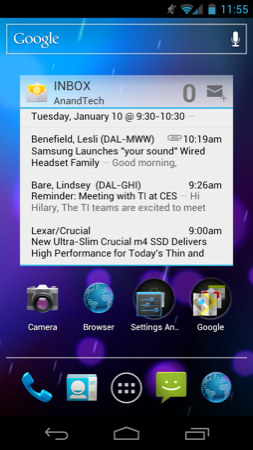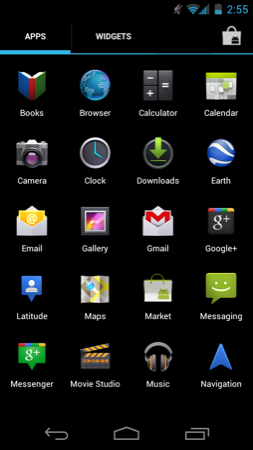Samsung Galaxy Nexus & Ice Cream Sandwich Review
by Brian Klug & Anand Lal Shimpi on January 18, 2012 1:34 PM ESTGoogle employs more than 20,000 people worldwide and the number of them working on Android are in the single digit percentage range. Google's business is search, but it has always had aspirations of more. Android isn't just a chance to capitalize on mobile search for Google, it's also an opportunity to grab power in the next era of personal computing. If you believe that smartphones will eventually replace mainstream PCs, who wouldn't want to be to smartphones what Microsoft was to PCs in the early 1990s?
Previous versions of Android have been cautious, evolutionary steps along a path to being a more open/flexible alternative to iOS. Starting with Honeycomb (Android 3.0) however, Google began to step out of the shadow of its competitors and really start to define Android as a mobile computing platform. Honeycomb was limited to tablets but its successor, Ice Cream Sandwich (Android 4.0), would bring unification to Android across both tablets and smartphones.
Today we look at both ICS and its launch vehicle, Google's Galaxy Nexus.
The Android vs. iOS Debate
It's very clear to me now more than ever that Apple and Google have completely different goals with their mobile OS strategies. Excluding the unclear strategy behind Chrome OS, Android is pretty much Google's primary operating system. The unified tablet/smartphone strategy behind Ice Cream Sandwich makes sense because for Google to succeed in the OS business it needs to deploy Android on everything from smartphones to notebooks. We've already seen the strengths in having a smartphone platform with a strong app ecosystem. Things become even more appealing if you have a phone, tablet and PC that all run the same OS and apps. As Android is Google's one-size-fits-all operating system, it needs to have a broader and slightly more ambitious focus than iOS otherwise it risks losing the race in the long run.
Apple is in a different position. It already has a successful desktop/notebook OS that is continuing to grow. While iOS has been a runaway success for Apple, the Mac OS X platform is a solid option for any user who needs more than their iPhone or iPad can provide. The two OSes may converge or at least borrow heavily from one another, but in the interim they can remain independent. If you need more of a computing experience Apple is happy to sell you a Mac. If you want the it-just-works appliance experience in your phone or tablet, Apple has a whole bunch of iPhone/iPad configurations to offer you.


ICS isn't a step towards iOS. If anything it proves that Google is committed to its own trajectory. Android is an OS that, although more closed than many would like, still allows more flexibility than iOS. You can sideload apps not purchased in the Market. The file system isn't completely hidden from you. You can even override the default zoom level on web pages. Apple and Google both pour tons of time and research into figuring out the best way to do something. And, to be honest, I feel like Apple generally does a better job of "getting it" for the very mainstream consumer. Rather than attempt to make the perfect mold however, Google gives you one that's a bit more flexible.
I've said this before but I do believe that Apple is trying to deliver more of an appliance experience, whereas Google is providing you with a modern take on a traditional computing experience. If the appliance is a smartphone, then both approaches are equally capable - it's just a matter of personal preference.
What's new in ICS really falls into one of three categories:
- Improvements in UI frame rate due to OpenGL ES rendering (non-skia) path
- UI tweaks
- New features
Nowhere in this list is a fundamental change in the way Android works. I feel that this is a very important point to understand and likely the cause for lots of disagreement when it comes to just how impressive (or not) ICS is.
ICS is smoother, more polished and has its own set of new features that make it a significant step forward for Android. What ICS is not however is an outright clone of iOS. If you prefer the iOS experience to Android, ICS will do nothing to change your opinion. If all you were missing from Android was a smoother UI, then its fourth major release should be almost everything you could ask for.










185 Comments
View All Comments
zorxd - Thursday, January 19, 2012 - link
And what exactly is more efficient?c4v3man - Thursday, January 19, 2012 - link
Their implimention of pseudo-multitasking as opposed to the much more flexible multitasking in Android.erple2 - Friday, January 20, 2012 - link
Bingo!Since the iOS can't do "true" multitasking, primarily as a design decision on Apple's part to greatly improve battery life (seen the battery life numbers on WebOS? They're pretty terrible), the requirements for memory are generally quite a bit lower than for Android.
You could argue all day as to which one is better, and still not come up with a clear winner. This is strictly due to the phone form factor. Given the limitations on usable screen size (can't display 2 apps at once reliably), and that you have to rely on battery life, the argument of which is "better" is more difficult to make. These all disappear when power is no longer a serious concern (desktop), nor physical screen display (notebook through desktop).
zorxd - Friday, January 20, 2012 - link
yeah and DOS is better because it works fine with only 1MB RAM.OCedHrt - Friday, January 20, 2012 - link
Which is fine due to fast app switching.trob6969 - Wednesday, January 18, 2012 - link
You didn't have to sacrifice GPU performqnce for a 4.3 inch 720p HD display. You could have done what i did and got an htc rezound. I downloaded Dead space, which is probably one of the most GPU demanding games for a phone, and gameplay is FLAWLESS on it! ZERO choppiness throughout the game. My rezound plays this game just as smoothly as my playstation 3. That says a lot about a phone's performance.metafor - Wednesday, January 18, 2012 - link
Note that with the increased clockspeed to the SGX540, the OMAP4460 matches the GPU performance of a Snapdragon S3 (used in the Rezound).Both chips perform similarly with the CPU clock at 1.2GHz (compare Sensation 4G to GN, for example).
dwang - Wednesday, January 18, 2012 - link
Deadspace runs perfectly fine on the galaxy nexus. No choppiness or slowdown.Zoomer - Thursday, January 19, 2012 - link
TI probably didn't anticipate the move to such high resolutions. The 540 was probably chosen as a good enough solution, given the power reqs are well.This is where Apple's hardware-software codesign wins out.
Johnmcl7 - Wednesday, January 18, 2012 - link
That reasoning that microSD cards are too slow seems to only apply to some of the cheap phones which pretty only use micro SD storage, for a phone like the Nexus it doesn't matter as you say because the micro SD card is for storage rather than applications. I don't really understand why the Nexus doesn't get a harder time for the lack of microSD storage given the relatively low onboard storage and high spec which means it can play back high resolution video which needs quite a bit of space. It's one of the main reasons I went for the Note instead which has the better camera, faster GPU and the micro SD storage allowing me to add 32GB very cheaply (and more down the line when 64GB cards come down in price) which is pretty necessary as the high resolution video recording and other features chew through space very quickly.John